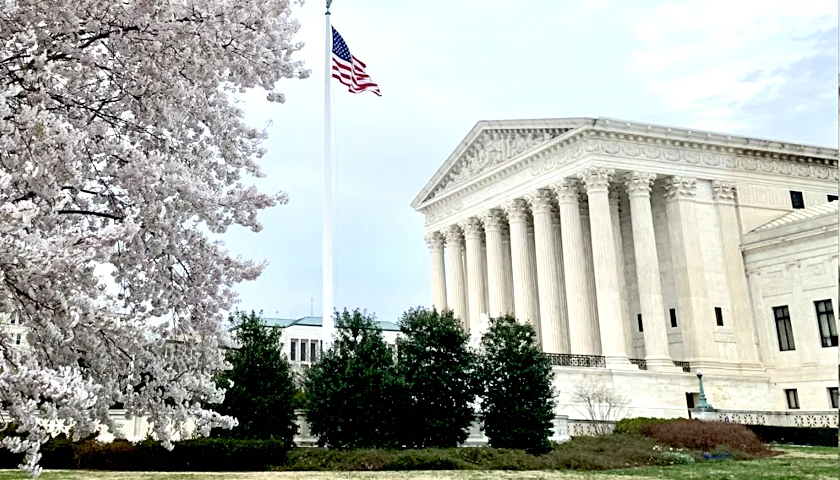Live from Music Row, Tuesday morning on The Tennessee Star Report with Michael Patrick Leahy – broadcast on Nashville’s Talk Radio 98.3 and 1510 WLAC weekdays from 5:00 a.m. to 8:00 a.m. – host Leahy welcomed Tennessee Attorney General Jonathan Skrmetti to the newsmaker line to discuss his recently filed amicus brief and the path forward for the consumer protection case of Gonzalez v. Google.
Leahy: On the newsmaker line right now is Tennessee Attorney General Jonathan Skrmetti. General Skermetti, you have been very busy. The folks at Big Tech and Google are probably not pleased to see your name these days.
Skrmetti: I think that might be true. And it’s great to talk to you, Michael. Hey, Aaron.
Gulbransen: How are you?
Skrmetti: Good to talk to you. So we’re going after Big Tech on multiple fronts. And the biggest development recently is in the United States Supreme Court. There is this provision called Section 230. I think a lot of your listeners have probably heard of this. It’s a provision that gives immunity to tech companies under certain circumstances.
And it started as a free speech provision, and it was good at that. But it’s been read too broadly, and the tech companies have used this to get away with all sorts of stuff over the years. And we’ve got a coalition together asking the US. Supreme Court to read this the way it’s written, to read it narrowly, and that will let the states go after Big Tech.
Leahy: The case is Gonzalez v. Google, and you filed what’s called an amicus brief with the United States Supreme Court. Tell our listeners exactly what an amicus brief is.
Skrmetti: Sure. So an amicus brief is when you’re not a party to the case, but there’s a legal issue that you’re concerned about. You can ask the court for permission to write a brief addressing the legal issue. The states do this a lot. Sometimes it’s bipartisan.
A lot of the time, it’s very partisan. This is actually a bipartisan coalition, and it’s a weird coalition. The Attorney General of Alabama, Steve Marshall, said he’d never quite seen anything like it. We’ve got some of the most liberal states and some of the most conservative states, and we’re all asking the court to read the law in a strictly textualist manner, the way it’s written, to allow states to engage in consumer protection enforcement against the Big Tech companies.
Leahy: So let’s talk about this. It’s very interesting because when you see engagement by state attorneys general, typically what you’ll see is all the Republicans will file a lawsuit or all the Democrat attorney general will file a lawsuit. In this instance, you’ve put together a coalition of 25 states and the District of Columbia. I’m just curious, General Skrmetti, how did you go about putting such a coalition together, and what are some of the blue states that are part of the coalition?
Skrmetti: So we’ve got New York and California in there as some of the blue states.
Leahy: Stop the presses! Leticia James, the attorney general of New York State now, I’d just say that she wouldn’t come to mind as somebody who would be allied with a conservative attorney general. And then California, how did you put those two together?
Skrmetti: Part of it is delicacy and part of it is the understanding that this is the issue for the states, right? I mean, we’re looking at social media platforms and the terrible damage they’ve inflicted on younger people.
We’re looking at antitrust issues with some of these companies where they’re abusing markets in ways we’ve never seen before. We’re looking at TikTok, which has a host of issues we could talk about.
And on the right, we’re certainly looking at the bias in moderation in social media and abuses involving silencing certain voices and amplifying others. The thing is, it’s a weird coalition, and the Supreme Court is going to notice that. So we were very deliberate about trying to get as broad a coalition as possible because they’re used to hearing from all the states on the right and all the states on the left.
But when you put together people saying, hey, this is our common ground, it gets the justices to sit up and pay extra attention, I don’t think you’re going to see a lot of this, but I’m really glad we are here.
Leahy: (Chuckles) So the question, I guess the legal question in the Gonzalez case, as you put it in your brief, does Section 230 of the 1996 Communications Act, does it immunize interactive computer services when they make targeted recommendations of information provided by another information content provider or only limit the liability of those services? Is that the big issue there?
Skrmetti: Yes, the big issue has to do with whether they’re publishing what someone says. And you can write any crazy thing on social media, and the media site cannot be sued for what you write. That’s what 230 says. That’s a good thing.
It allows people to have open and honest conversations. It’s a free speech provision. But what we’re looking at with the tech companies is the algorithms they use that amplify certain voices, silence or diminish other voices. And we know that some of the ways that they amplify voices can be extremely damaging.
For instance, Anorexia and teen girls. There are algorithms running that continually steer younger people towards really harmful content for a relatively complicated set of reasons that ultimately boils down to that’s the way the companies make the most money off of these users. We want to be able to make them stop.
Leahy: What’s the path of Gonzalez v. Google? Do you just file the amicus brief, or do you go and present that argument to the court itself?
Skrmetti: Well, I hope we get a chance to argue it. It was written by this incredible lawyer in my office, Matt Rice. He clerked for Justice Thomas. He is a sharp cookie. We had a good team working on it. He was the lead author. I’d love to give him a chance to argue in Court.
Usually, though, they don’t give the amicus authors the opportunity to argue, but they do often quote these briefs, and they certainly read them. And they certainly read them. When you have 26 states, especially from such a broad spectrum of ideology.
Leahy: When will the oral hearing be, and when do you anticipate the court will announce its decision in Gonzalez v. Google?
Skrmetti: It will probably be argued next term. The date hasn’t been set yet, so it could be close to a year away and probably, I would guess, six months after that, the decision. So we’re still quite a ways off from getting a resolution here.
Leahy: You mentioned TikTok, and I want to follow up on TikTok a little bit. Now, as I understand it, TikTok is owned by a Chinese company, and it’s in the business of collecting information on Americans. Many have argued it’s actually a national security threat.
I’ve seen where a couple of state governors have said we’re banning the use of TikTok on state-owned computers and state-owned cell phones. What are your thoughts on TikTok? Is there anything that you, as attorney general, may be doing to address the potential national security risk posed by TikTok?
Skrmetti: I think there are a number of problems with TikTok. Some of them I can do something about. Some of them I can’t. I think Governor Lee has expressed concerns about this issue too. Obviously, the Tennessee congressional delegation is concerned about this. It’s a big issue.
What we can do from the attorney general perspective is look at what representations TikTok has made and if they’re lying. If they’re lying about what data is being collected, if they’re lying about where that data is going if they’re lying about how that data is being used.
If they’re otherwise lying to get more users on the platform so they can suck in more data, we are able to hold them accountable for that, and we’re able to get injunctive relief, either preventing them from engaging in that misconduct or potentially escalating that.
There’s a provision that allows us to bar a company from doing business in the state of Tennessee. And usually, we use that for scam artists, but there may be occasions where we need to use that as our big cannon in one of these disputes.
Listen to today’s show highlights, including this interview:
– – –
Tune in weekdays from 5:00 – 8:00 a.m. to The Tennessee Star Report with Michael Patrick Leahy on Talk Radio 98.3 FM WLAC 1510. Listen online at iHeart Radio.
Photo “Attorney General Skrmetti” by tn.gov.





